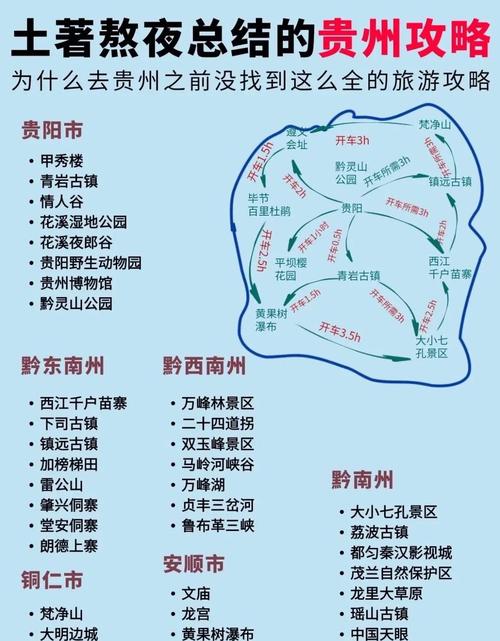2025贵州自驾游精华攻略:一场关于山水、民族与美食的奇幻之旅
贵州,被誉为“公园省”,是一片被上帝偏爱的土地,这里有层峦叠嶂的喀斯特峰林、如梦似幻的瀑布梯田、古朴神秘的少数民族村寨和令人垂涎的酸辣美食,自驾游是探索贵州的最佳方式,让你能自由地穿梭于山水之间,深度体验这片土地的魅力。

(图片来源网络,侵删)
最佳旅行时间
- 春季(3-5月): 杜鹃花海盛开,尤其是百里杜鹃景区,漫山遍野,景色壮观,天气温和,适合出行。
- 秋季(9-11月): 天高云淡,雨水较少,能见度高,是观赏梯田(如加榜梯田)和摄影的黄金季节,气候凉爽舒适。
- 夏季(6-8月): 虽然是雨季,但贵州的雨多为阵雨,雨后空气清新,瀑布水量充沛,气势磅礴,需注意防范道路湿滑和局部山洪。
避开黄金周(国庆)和“小长假”,否则热门景点会人山人海,交通拥堵。
核心路线推荐
贵州地形以山地为主,自驾路程较长,弯道多,建议选择一条或两条主线,避免过于奔波。
经典全景环线(7-8天)
这条路线涵盖了贵州最精华的西线景点,适合第一次来贵州的游客。
-
D1:抵达贵阳,休整准备
 (图片来源网络,侵删)
(图片来源网络,侵删)- 贵阳是贵州的交通枢纽,飞机、高铁均可抵达。
- 住宿建议:选择在喷水池、大十字、河滨公园附近,交通便利,美食云集。
- 晚餐必吃:丝娃娃、肠旺面、花溪牛肉粉。
-
D2:贵阳 → 安顺 → 黄果树瀑布(约150km,2.5小时)
- 上午从贵阳出发,沿沪昆高速向西。
- 下午游览黄果树瀑布。强烈建议预留一整天时间,因为除了主瀑布,还有天星桥景区(精华,水上石林、数生石)和陡坡塘瀑布(《西游记》取景地)。
- 住宿:黄果树景区附近或返回安顺市区,景区附近住宿更方便,但选择较少;安顺市区选择多,美食更丰富。
-
D3:安顺 → 龙宫 → 荔波(约200km,3.5小时)
- 上午游览龙宫景区,以水溶洞、瀑布、峰林、绝壁、溪河、石林、漏斗、暗河等多种喀斯特地质地貌集于一身,被誉为“大自然的大奇迹”。
- 下午驱车前往荔波,这是前往“地球腰带上的绿宝石”的必经之路。
- 住宿:荔波县城。
-
D4:荔波小七孔一日游
- 全天游玩小七孔景区,这里有“地球腰带上的绿宝石”之称,景点分布较散,需要乘坐景区观光车,核心看点:小七孔古桥、拉雅瀑布、68级跌水瀑布、水上森林、鸳鸯湖(划船必体验)等。
- 下午返回荔波县城住宿。
-
D5:荔波 → 荔大高速 → 榕江/从江(约300km,4.5小时)
 (图片来源网络,侵删)
(图片来源网络,侵删)- 这是行程中比较辛苦的一天,但风景绝佳,穿梭于黔东南的群山之中。
- 下午抵达榕江或从江,这两个县城都是前往加榜梯田和肇兴侗寨的门户。
- 住宿:榕江或从江县城。
-
D6:加榜梯田深度游
- 从榕江或从江出发,前往加榜梯田(车程约3-4小时,路况为盘山公路,新手需谨慎驾驶),加榜梯田比龙脊梯田更原始、更壮丽,有“行走的山水画”之称。
- 建议住一晚梯田里的民宿,清晨和傍晚的光影是摄影的黄金时间。
- 住宿:加榜梯田内民宿。
-
D7:加榜梯田 → 肇兴侗寨(约150km,3.5小时)
- 上午欣赏完梯田晨雾后,驱车前往肇兴侗寨,这是中国最大的侗族村寨,也是“中国最美乡村古镇”之一。
- 下午在侗寨里闲逛,参观鼓楼群(仁、义、礼、智、信五座鼓楼),感受侗族风情。
- 住宿:肇兴侗寨内,体验吊脚楼民宿。
-
D8:肇兴侗寨 → 黎平 → 贵阳(约450km,5.5小时)
- 上午可以从肇兴出发,顺路参观黎平会议会址(红色旅游景点)。
- 下午沿沪昆高速或三黎高速返回贵阳,结束愉快的旅程。
黔东南风情线(5-6天)
如果你对少数民族文化和田园风光更感兴趣,可以专注于黔东南。
- 路线:贵阳 → 凯里 → 西江千户苗寨 → 镇远古镇 → 肇兴侗寨 → 贵阳
- 特点: 以苗族和侗族文化为主,节奏相对舒缓,有古镇、有村寨、有山水。
必游景点详解
- 黄果树瀑布: 亚洲第一大瀑布,气势磅礴,必打卡,建议穿雨衣,体验瀑布下的“水帘洞”。
- 荔波小七孔: 喀斯特森林景观的集大成者,水色碧绿如玉,步道穿梭于山水之间,非常惬意。
- 加榜梯田: 梯田的线条优美,云雾缭绕时如仙境,需要一定的毅力和时间才能深入体验。
- 肇兴侗寨: 鼓楼林立,风雨桥横跨溪上,夜晚灯火璀璨,宛如天上宫阙,可以听侗族大歌,尝长桌宴。
- 镇远古镇: 舞阳河穿城而过,形成“S”形,北岸为旧府城,南岸为旧卫城,夜景尤其迷人。
- 西江千户苗寨: 世界上最大的苗族聚居村寨,层层叠叠的吊脚楼非常壮观,可以体验苗族文化。
美食推荐
贵州美食以“酸、辣”闻名,口味独特。
- 丝娃娃: 薄如蝉翼的面皮裹着各种蔬菜丝,淋上特制蘸水,是贵阳小吃的灵魂。
- 肠旺面: 猪大肠、旺子(猪血)、脆哨(炸猪油渣)配上爽滑的碱面,汤头浓郁。
- 花溪牛肉粉: 汤鲜味美,牛肉软烂,是贵州人最爱的早餐之一。
- 酸汤鱼: 凯里菜的代表,用番茄、辣椒等发酵的酸汤做底,煮上新鲜的江团或草鱼,酸辣开胃。
- 糯米饭: 将糯米与腊肉、花生、香肠等一起蒸制,香气扑鼻。
- 烙锅: 毕节的特色,在铁板上烙各种肉类和蔬菜,自己动手,乐趣无穷。
- 折耳根: 贵州人的“挚爱”,鱼腥草,可凉拌、可做蘸水,外地人可能需要适应。
行前准备与注意事项
- 车辆检查: 出发前务必检查刹车、轮胎、机油、灯光等,特别是长途山路,安全第一。
- 导航与路况:
- 手机导航(高德、百度)基本覆盖,但部分山区信号可能不稳定。
- 贵州多隧道和长下坡,注意控制车速,合理使用刹车,避免刹车过热。
- 加油:看到加油站就尽量加满,山区加油站间距较远。
- 住宿预订: 旺季(节假日、夏季)务必提前预订,尤其是在景区内的住宿。
- 天气与衣物: 贵州天气多变,“天无三日晴”,即使是夏天,早晚也较凉,建议采用“洋葱式”穿衣法,备好雨具(雨衣比雨伞方便)和一件薄外套。
- 尊重习俗: 进入少数民族村寨,请尊重当地的风俗习惯,拍照前先征得对方同意,不要随意触摸祭祀用品和进入禁忌区域。
- 必备物品:
- 药品: 晕车药、肠胃药、创可贴、防蚊虫叮咬的药。
- 防晒: 高原紫外线强,防晒霜、帽子、墨镜必备。
- 其他: 充电宝、保温杯(随时可以喝到热水)、舒适的徒步鞋。
预算参考(按人均计算)
- 经济型: 2000 - 3000元/人(住宿青旅/经济型酒店,自己做饭为主,公共交通+拼车)
- 舒适型: 3000 - 5000元/人(住宿特色民宿/三星级酒店,品尝特色餐厅,全程自驾)
- 豪华型: 5000元以上/人(高端度假酒店,包车/自驾,享受更好的服务和体验)
也是最重要的一点:放慢你的脚步。 贵州的魅力在于不经意间的一处风景、一句乡音、一顿美食,祝你在贵州有一段难忘的自驾旅程!




